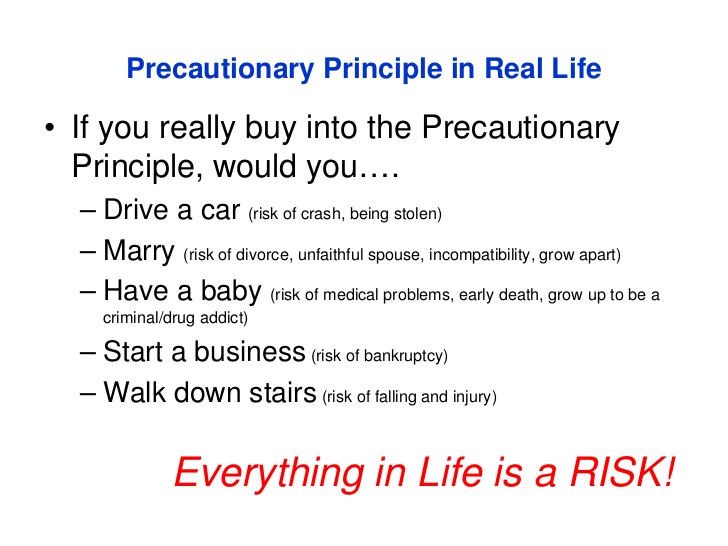A guest post at Catallaxy Files on the madness of taking the Precautionary Principle as your guide:

Slide from a presentation by Patti Gettinger, 2011-07-11.
Original slideshow at https://fr.slideshare.net/regsgridlock/the-precautionary-principle-8656034
In the unprecedented trampling of rights characterised by the response to the global pandemic of COVID-19, the common justification is that it will save lives, as though no measure is too great to save even one life.
This has echoes of the Precautionary Principle, which has pushed aside ubiquitous risk management principles in such areas as climate change, invariably to justify unlimited spending which risk management principles would otherwise limit. In other words, it’s a principle which can be used to justify any measure. And here we are.
One fundamental difference between the competing principles is the concept of marginal benefit, which, simply put, is the point where the benefits of an action no longer outweighs the cost. Our new “rules” from the newly formed National Cabinet, of which no legal or constitutional standing exists, has far surpassed the point of marginal benefit.
A person fishing off the coast alone in a small boat is in breach of the rules, as is a person playing golf alone, or a person sunbathing on a rock in the outback, yet in none of these examples can any measurable likelihood of spreading it or catching the disease be identified. These situations would fail any risk management approach, but not the Precautionary principle. Any risk, that is, any potential risk that can not be confidently identified as absolute zero, is a risk not worth taking, but that is not how we live our lives, because we understand that everything involves risk. Driving a car, catching public transport, having a job, not having a job, leaving your house or indeed staying in it involves some level of risk.
Also central to risk management is the concept of mitigation; the potential actions that can reduce, transfer or eliminate identified risks. In the case of COVID-19, many mitigation measures have been identified, and implemented. Such mitigations implemented are travel bans (belatedly), banning large crowds (belatedly), temperature screenings, washing hands, social distancing, pandemic announcements (belatedly, again), face masks (very belatedly), and fit-for-purpose hospitals (you guessed it). All of these easily demonstrate a benefit greater than worst-case scenario costs, yet after being bystanders for weeks, leaders across the globe then overreacted far beyond the demonstrable benefits. At least benefits to us.



